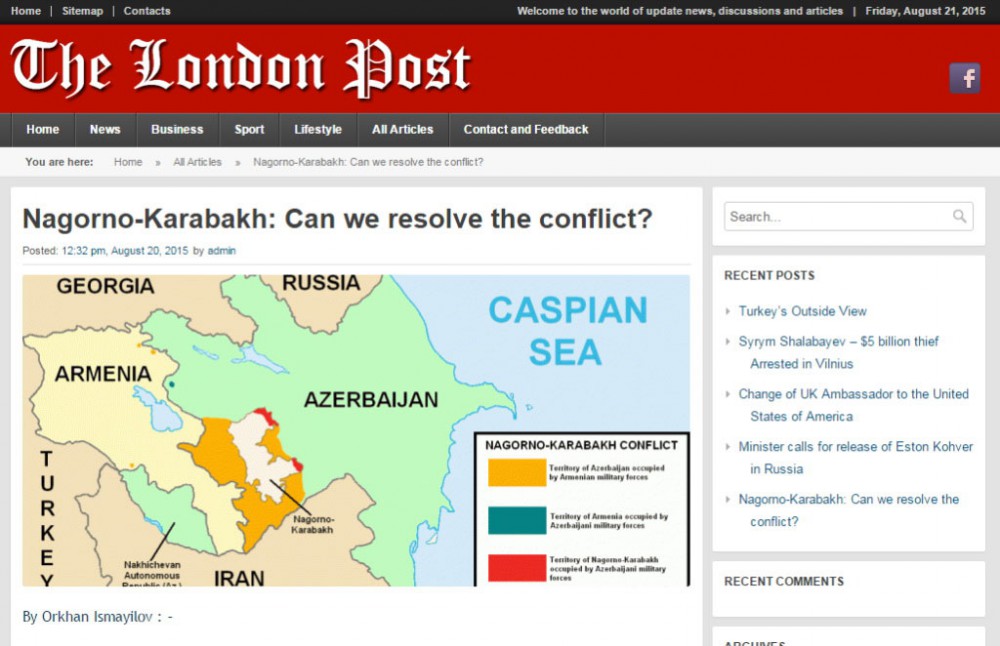ID :
377932
Fri, 08/21/2015 - 15:02
Auther :
Shortlink :
https://oananews.org//node/377932
The shortlink copeid
The London Post issues AZERTAC special correspondent's article on Nagorno-Karabakh conflict

Baku, August 21, AZERTAC
The UK-based The London Post newspaper has published AZERTAC's special correspondent in the country Orkhan Ismayilov's analysis on Nagorno-Karabakh headlined "Nagorno-Karabakh: Can we resolve the conflict?" The article reads:
"For nearly 30 years Armenia and Azerbaijan relations have been dogged by the failure to resolve the problem of Nagorno-Karabakh. Nagorno-Karabakh is under the control of Armenia inhabited by many people of Azerbaijani descent and part of Azerbaijan but attacked and annexed by Armenian authorities," the article says.
The author underlines that the crisis began on February 20, 1988 when representatives of the Armenian community of NKAO (Nagorno-Karabakh Autonomous Oblast) at the session of the Soviet of People's Deputies, adopted a decision to send a petition to the Supreme Soviets of the Azerbaijan SSR (Soviet Socialist Republic) and the Armenian SSR for the transfer of the NKAO from the Azerbaijan SSR to the Armenian SSR. During an otherwise peaceful demonstration against this decision two Azerbaijani youths were killed becoming the first victims of the conflict.
Between1988-1989 Azerbaijanis were forced to leave Armenia. In the course of mass deportation at least 216 Azerbaijanis were killed and 1,154 people were wounded. The refugees from Armenia — eventually numbering approximately 200,000 people — began to arrive in Azerbaijan.
The collapse of the USSR in 1991 and political instability in Azerbaijan and in Armenia encouraged the Armenians to attack Azerbaijanis in Nagorno-Karabakh, in the city of Khojaly in 1992. Known as the Khojaly genocide, thousands of Azerbaijani residents were killed or captured and Khojaly City itself was destroyed. In his book Black Garden, (2003) British journalist Thomas de Waal published an interview with the President of Armenia and an Armenian field commander commenting on the destruction of Kholjaly. The former field commander said: "Before Khojaly, Azerbaijanis thought they could play tricks with us. They thought Armenians would never touch civilians. We were able to break that myth."
In 1993, the Armenian armed forces occupied six districts surrounding Nagorno-Karabakh, resulting in the occupation of almost one-fifth of Azerbaijan's territory.
Officially, Yerevan denies any direct involvement by Armenia in the conflict. However, there is considerable evidence confirming participation of the Armed Forces of the Republic of Armenia in hostile actions against Azerbaijan. In spite of a ceasefire declared in 1994, the ceasefire has been violated several times by the Armenians.
What do international organisations and the international community think about this "frozen" conflict? Why has this injustice to Azerbaijan`s people and its territorial integrity been allowed to continue for more than twenty years?
Between April and November 1993 the UN Security Council adopted no less than four resolutions (№s. 822, 853, 874, 884) demanding immediate withdrawal of all occupying forces from Azerbaijan`s districts. These resolutions were ignored by Armenia so that when the ceasefire came into effect in 1994, the territory of former NKAO and seven adjacent districts was already beyond Azerbaijan`s control. Since 1993, other international organisations such as the UN General Assembly, The Parliamentary Assembly of the Council of Europe and The European Parliament have passed numerous resolutions regarding Nagorno-Karabakh. These resolutions express concern that the conflict remains unresolved. The OSCE Minsk Group, co-chaired by Russia, the USA and France has so far been the only organisation seeking a unilateral resolution of the conflict.
Nagorno-Karabakh has been recognized as part of Azerbaijan by almost all international organisations such as the UN, the OSCE, the Council of Europe, the European Parliament, the OIC, NATO, and GUAM, as well as by parliaments and heads of many states. It is only Armenia, which has established a puppet state in the occupied regions of Azerbaijan, which does not consider Nagorno-Karabakh as part of Azerbaijan.
Armenia's apparent reluctance to engage in the peace process has been harmful for Armenian development and the South Caucasus region as a whole. As a consequence of this conflict, Armenia has isolated itself from the outside world. Transportation routes and pipelines, (such as TANAP and TAP) which have international importance, bypass Armenian territory. Most of its borders are still locked, negatively impacting its and the region`s economic relations. Both the leaders and national elite of Armenia need to realize that territorial issues are resolved today on the basis of international law. Failure to learn the lessons of history means Armenia is compelled to repeat the errors.
Above all, the conflict must not be allowed to poison the relations between a new younger generation of Azerbaijanis and Armenians. Azerbaijan lives in hope that the Armenians will find the strength to resolve the question of Nagorno-Karabakh and to look towards a brighter and more hopeful future for the region.”





